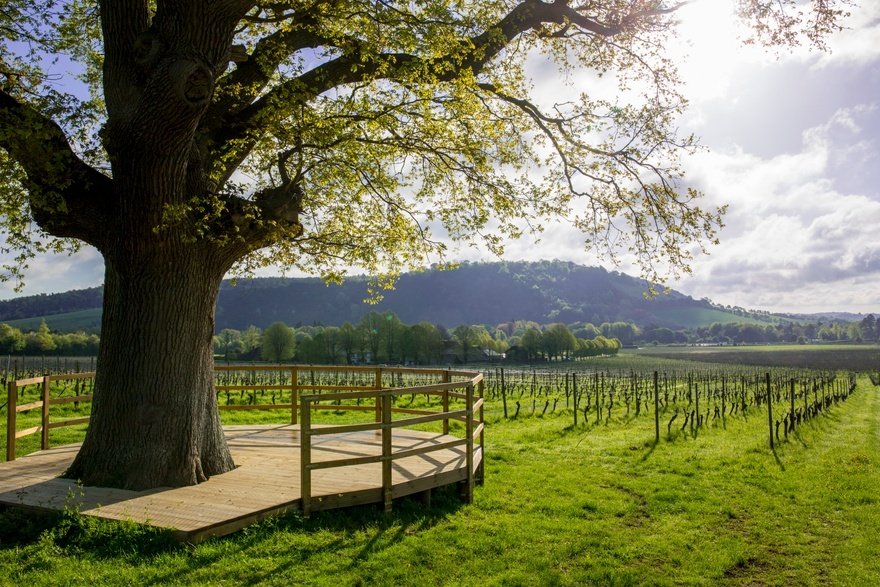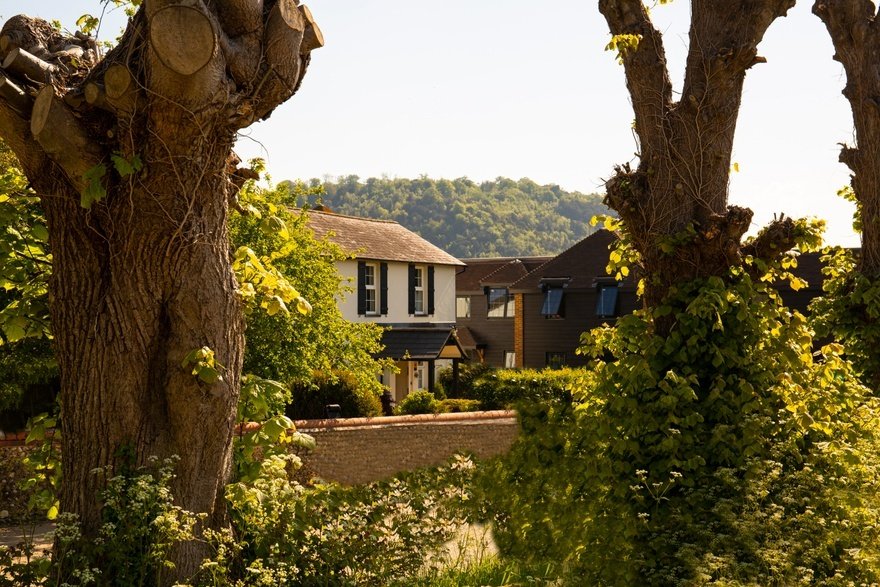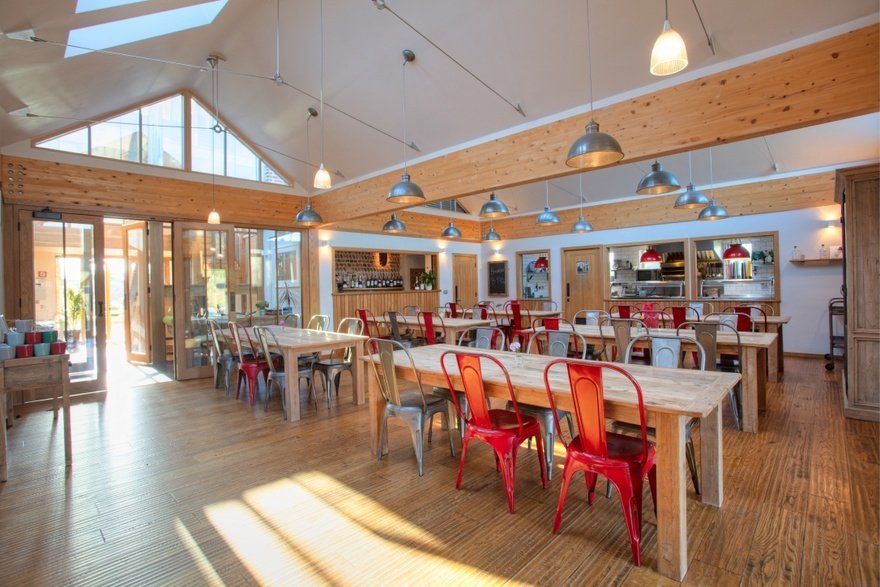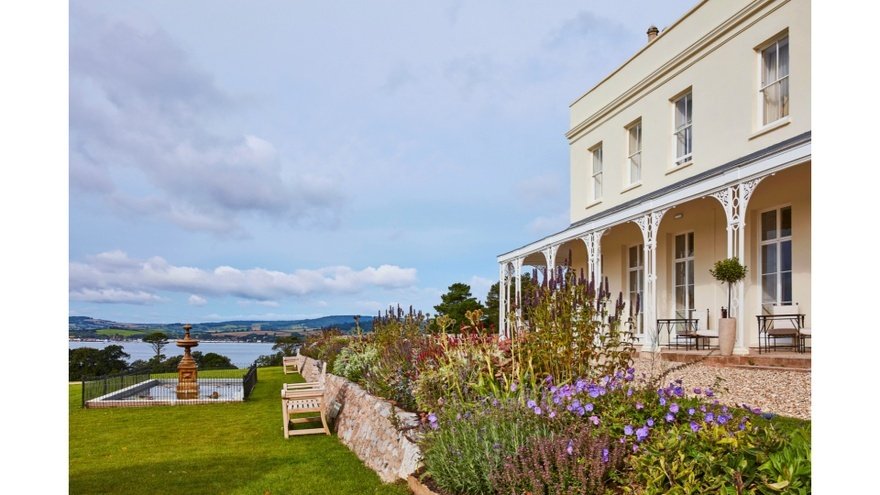The expansion of the British wine industry has opened up an opportunity for experiential hotel and restaurant offerings. Fiona Sims reports
T he morning sun casts a golden light on the vines as it rises over Box Hill. The grapes hang heavy as vineyard workers position their boxes and ready their secateurs, waiting for the cue to pick. We have a ringside view, from the new restaurant in England's first proper vineyard hotel at Denbies Wine Estate near Dorking in Surrey.
Surrounded by natural bark walls and vintage riddling racks, we munch on a breakfast of Welsh rarebit, cockles and laverbread, plus Cullen skink, soldiers and poached egg, from a contemporary British menu overseen by new executive chef Michael Hudson, as the largely Bulgarian team of pickers work their way expertly along the rows of Reichensteiner in front of us.
It's the last day of September, yet only 9% of the grapes on Denbies Estate have been picked. Thanks to a shy sun and some unusually humid conditions, it's been a tricky summer, but the grapes are tasting good, reports tour guide Anne Denny, who earlier escorted us around the estate on its Secret Vineyard Tour, one of many experiences offered.
Visitor numbers at Denbies are growing year-on-year, with more than 350,000 at the last count, and tours were fully booked throughout the summer. In addition to the new restaurant, which opened a week ago for dinner only for both residents and non-residents, the former seven-bedroom B&B in the 1830s farmhouse has been completely renovated and a new 10 en suite bedroom block added, with double room rates starting at £105 – the lot re-launched as the Vineyard hotel.
"We were running at 97% occupancy, and what with the various gift experiences that we offer, there were hardly any free rooms available for regular guests," explains Denbies chief operating officer Jeannette Simpson. It took a while to get the hotel up and running – nearly three years, thanks to some planning issues – but the last few bedrooms finally opened a couple of weeks ago.
So who will come? "We have a huge customer base and they are all quite different, which can be a challenge, but it keeps us on our toes. Our demographic has changed a lot in recent years. Yes, we are getting many more overseas visitors, but we are also getting a lot of the London crowd, too – we're just 50 minutes from both Victoria and Waterloo and trains run every half an hour," says Simpson. "We're seeing a younger crowd, too. They're engaging more with wine these days and they are surprisingly discerning."
Simpson has recently installed a couple of wooden ‘cabanas' in front of the vines for private tastings, inspired by her trips to northern California: "California sets the benchmark for wine tourism – I always come back with ideas," she grins, before outlining the estate's impressive sustainability credentials, from solar panels to bat conservation and beehives.
Denbies, which started life back in the early 1990s, is one of the country's oldest wine producers, as well as one of the largest single estates, with 265 acres of vines turning out some 300,000 bottles annually across a 14-strong range. Its Surrey Gold blend is its biggest seller, at £9.75 from the cellar door, with the minerally, baked apple-scented Cubitt Blanc de Noirs its top wine, at £34.
The new hotel is the latest chapter in Denbies' evolution, which was the brainchild of Adrian White and is now run by his son Chris. It sits alongside a farm shop, a thriving conference and events business (they had 60 weddings this year), and a second restaurant, the Gallery, with its 360-degree views over the vine.
The Gallery is open for lunch seven days a week and is popular with group tours and locals alike, the latter claiming the estate as their own thanks to the open access policy, which sees a steady stream of joggers, cyclists and walkers trailing through the property, some stopping off for lunch and a glass or two. The next stage is a Wellness Centre, currently being built, which will offer pilates and yoga, and even a doctor on site.
A growing sector
The reason Denbies couldn't declare theirs as the first UK wine estate hotel is because of Llanerch Vineyard in the Vale of Glamorgan. The new 26-bedroom hotel at Llanerch opened its doors on the 28 April, along with an 80-cover restaurant focusing on pairing the estate's wines with local produce, presided over by Hampshire-born head chef Andy Aston.
It's not an entirely new offering – since 2011, the Welsh wine estate has offered an 11-bedroom guesthouse and a 30-cover restaurant, but, like Denbies, the rooms were continually booked. "We got frustrated seeing people going off to stay in other hotels, so we decided to take the risk and expand," explains Llanerch Vineyard's managing director, Ryan Davies. And it has paid off, with 86% occupancy since re-opening in April.
"We get a lot of weddings, certainly, but we are seeing many more wine tourists coming through from all over the world – particularly Canadians and Americans. Many British people, too. They want the whole experience, from the vineyard tour to the wine pairing dinner. I reckon we'll see many more hotels in UK vineyards in the coming years," predicts Davies.
The hotel offers a package called the Wine Escape, from £200, which includes a bottle in the room, a vineyard tour, a tutored wine tasting, a three-course meal and overnight stay, plus breakfast. Room rates start at £135 per night, rising to £250 for the smartest rooms.
"We've made everything much more luxury, from the food to the rooms – high-end accommodation was lacking in this area," he says. "The bigger picture, alongside soon doubling the seven acres of vineyard that we already have, is to open a farm shop along with a dedicated area complete with walkways and signage that explains the history of the place, plus a wine tasting room, so it all flows nicely," shares Davies.
The Rathfinny Wine Estate in East Sussex has also recently upgraded its room offering to attract a more discerning wine tourist. Established in 2010 by Mark and Sarah Driver, it produces award-winning Sussex sparkling wines (available only on allocation – guests can buy one of each wine per visit) and has become a destination for both wine tourists and food lovers, who flock to its Cellar Door for vineyard tours and wine tastings, and to the Tasting Room restaurant, with its far-reaching views over the vineyard and hills beyond, under the direction of head chef Chris Bailey.
Says Rathfinny's head of business development Georgia Mallinson: "We have seen a big increase in interest in wine tourism and in the numbers of visitors to the estate. Our current rolling footfall is around 20,000 people, with many locals visiting the restaurant, and an increasing number of guests from London."
Its rustic-chic Flint Barns provides 10 bedrooms, sleeping up to 30 people (some are family rooms), with dinner, bed and breakfast breaks available from £155 for two.
Lympstone Manor is about as high-end as it gets when it comes to wine estate hotels in the UK, with its 21 sumptuous bedrooms, starting at £315 including breakfast), and the restaurant achieving a Michelin star six months after opening.
The Grade II-listed Georgian mansion in Devon opened as a luxury country house hotel in April 2017, restored and renovated by celebrated chef Michael Caines, who realised his ambition to create "contemporary country house hospitality for the 21st century" – and that vision included a vineyard.
In May 2018, Caines planted 17,500 vines on a prime south-west facing site on the 28-acre estate on the East Devon Exe estuary. "Most of the great vineyards of Europe are located near rivers: the Médoc Châteaux of Bordeaux on the Gironde, wine estates along the Rhône, Loire, and Rhine rivers, the great port vineyards of the Douro. So why not the Exe estuary? Our climate is mild and the success of other local vineyards has convinced me that it will be possible to produce outstanding wines here," he says.
Sparkling wine is the focus for Caines, with the usual Champagne grapes planted: Chardonnay, Pinot Noir and Pinot Meunier. And it will be made the Champagne way, down to the secondary fermentation in the bottle. The first harvest will be in autumn 2020, reports Caines, with the first bottles released in 2023. Earlier this year, Lympstone Manor launched its vineyard tours. "There has been a considerable amount of interest from both hotel guests and local visitors to come and see the evolution of the vines and learn more about the art of winemaking. It's an exciting time for the UK wine industry and as we see more guests looking for experience-driven travel, we anticipate that the demand for hotels producing their own wine and with on-site vineyards is likely to thrive as a result."
Cue Tillingham. The latest UK wine estate hotel opened in October on a farmstead in East Sussex, set in 70 acres of rolling hills, farmland, woodlands and vineyards, with views across to the fortified hill town of Rye to the salt marshes and sea beyond.
It's the brainchild of Ben Walgate, the exchief executive of Kent's Gusbourne Estate. "We're not marketing it as a hotel as such, more a food and wine destination," he explains. The farm's hop-drying barn has been converted into 11 en suite guestrooms, with interiors by McCully and Crane (who did the interiors at the George hotel in Rye). Accommodation is available five nights a week, Wednesday to Sunday, from £150, including breakfast, rising to £225 for the larger rooms. Future plans include eco-lodges and bell tents on the site.
In addition, there will be a restaurant, offering breakfast, lunch and dinner, with a fivecourse set menu that will change every week. The chef is to be confirmed, but Walgate is currently consulting with sustainability chef champion Doug McMaster of Silo restaurant in Hackney, as the focus at Tillingham will be on zero food mileage.
"We want to be entirely self-sufficient, with every ingredient served grown on the estate," announces Walgate. "Think of it as a wine-themed Coombeshead Farm," he adds, making reference to Tom Adams' acclaimed Cornwall restaurant with rooms. "Our philosophy at Tillingham is best summarised as progressive – incorporating what we know of the best scientific and technological knowledge, while championing ancient traditions and best practice learned from a millennia of farming and winemaking."
Read natural wine – with knobs on, and from one of the UK's handful of minimal intervention wine producers. Walgate's wines have already gained cult status, thanks partly to Guildford-based distributor Les Caves de Pyrene. His Pét-Nat, and other wines – he will make 19 different wines this year, all small batch and very experimental, such as the Ortega aged in Georgian qvevris and a Col Fòndo Prosecco-style wine called ‘Col', inspired by trip to Venice – are coveted by some of the capital's top restaurants. In fact, such is the demand that Walgate is now exporting a third of his production to eight countries, including the US.
Among other plans, there will also be a wine bar cum wine shop at Tillingham, open seven days a week, from 9am to 5pm, and from Thursday to Saturday in the evenings too, offering small plates, pizzas, cheese and charcuterie. Not long ago you'd struggle to catch a glimpse of vines on English hills, but now slope after sunny slope is sprouting vines, with wineries opening their doors, offering wine trails and vineyard tours, tasting rooms and restaurants – and now hotels, too. And with English wines gaining a reputation on the world stage, expect many more wine tourists to come our way.
GB wines in a nutshell
The output of the UK wine industry might still be small fry compared with other wine-producing counties (think the US state of Oregon for a comparative size), but it has come a long way since its first commercial vineyard was planted in Hampshire in 1952, winning high-profile awards and trophies, mainly for its sparkling wines, fuelling some serious investment in land.
Add to that the continuing interest from Champagne brands – Vranken-Pommery launched its debut release last year in partnership with Hampshire's Hattingley Valley, and Taittinger is establishing its vineyard near Faversham in Kent with UK partners Hatch Mansfield, called Domaine Evremond, and the future is bright for GB wine.
The largest proportion of UK vineyards and wineries are in south-east England, particularly in Kent, East Sussex, West Sussex and Surrey. South-east England is one of the UK's warmest, driest, sunniest areas, providing good conditions for high-quality, cool-climate grape growing.
These areas are well over a hundred miles north of the more established wine-producing locations in Europe, such as France's Champagne region, but recent climate change has played a key role in the northerly expansion of viticulture, opening new opportunities to grow grape varieties that would have struggled to ripen even 50 years ago. So while British weather can play havoc with grape growing, skilled vineyard workers and winemakers are now producing wines that can rival the best in the world.
Due to small production numbers, many of these wines have limited supplies or are even allocation only, with tiny amounts trickling through to local restaurants.
The best way to taste is to go direct to the source. The tourism offering from UK wine estates is growing year-on-year and includes tours and tasting rooms, cafés and restaurants, with a number of the larger estates offering places to stay, with accommodation ranging from glamping to luxury lodges to the first fully functioning wine estate hotels.
The wine hotels
Vineyard hotel
- Denbies Wine Estate, London Road, Dorking, Surrey RH5 6AA
- www.denbies.co.uk/denbies-vineyard-hotel
Llanerch Vineyard hotel
- Llanerch, Hensol Road, Pontyclun CF72 8GG
- www.llanerch.co.uk/hotel
Flint Barns
- Rathfinny Wine Estate, White Way, Polegate, East Sussex BN26 5TU
- www.rathfinnyestate.com/flint-barns/
Lympstone Manor
- Courtlands Lane, Exmouth, Devon EX8 3NZ
- www.lympstonemanor.co.uk
Tillingham
- Dew Farm, Dew Lane, Peasmarsh, East Sussex TN31 6XD
- www.tillingham.com/visit/stay
Continue reading
You need to be a premium member to view this. Subscribe from just 99p per week.
Already subscribed? Log In










